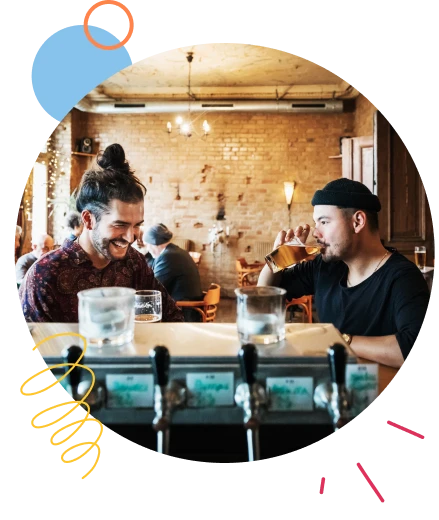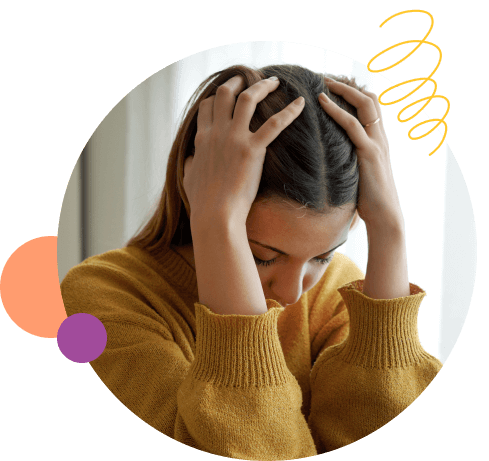The NDSS is administered by Diabetes Australia
- /
- Partying alcohol drugs and relationships
Type 1 diabetes shouldn’t stop you going out, having fun and doing the things you enjoy. But if you decide to drink alcohol, it’s important you know how it will affect your diabetes, and what you can do to keep as safe as possible when drinking.
Alcohol is the most common, recreational drug used in Australia. It’s legal for people over the age of 18 years.
But how much is too much alcohol?
If you’re under the age of 18, it’s recommended you don’t drink any alcohol.
Besides it being illegal, your body and brain are still developing, and alcohol can negatively affect this development.
If you are over 18 years, current guidelines recommend you limit your alcohol intake to:
A standard drink has 10 grams (g) of alcohol.
Some examples of what a standard drink looks like are:
Beer
285ml 4.8%
Wine
100ml 13.5%
Spirits
30ml 40%

Drinking alcohol can increase your risk of low blood glucose level (hypoglycaemia or a hypo for short). This is because your liver is busy processing the alcohol, instead of releasing glucose. This results in lower blood glucose levels not only while you’re drinking, but also in the hours after you stop drinking.
Talk to your diabetes health professional about when to check your blood glucose level when you drink and how to reduce the risk of hypos.
Different types of alcohol can affect your body differently, depending on the amount of alcohol and carbohydrate (carb) in the drink. Alcohol can lower your blood glucose levels. But some alcoholic drinks such as pre-mixers have carbs, and this can raise your blood glucose level while you’re drinking.
It’s easy to overestimate the size of a standard drink, no matter which alcoholic drink you choose. Therefore, it’s a good idea to get to know what a standard drink is for each type of alcohol you drink. You can do this by checking the number of standard drinks on the label of the bottle or can. Or by measuring a standard drink if you’re at a friend’s place (for example, 100mls for a glass of wine).
But remember the average drinks serving in restaurants and pubs can be bigger than one standard drink.





Before you go to bed

Stick to your normal routine the next day by checking your blood glucose level, taking your insulin and eating well.
Even if you don’t feel like it, always have some breakfast if you’ve been drinking the night before. This will help your blood glucose levels and make you feel better.
Some common hangover symptoms are similar to the symptoms you get with a hypo – make sure you check your blood glucose levels in the morning.
Headache
Feeling sick
Sweating
Shaking
No matter how awful you feel, if it’s a hypo you need to treat it straight away.

When you have diabetes, not smoking is one of the best things you can do to protect your health now and in the future. Smoking is bad for everyone, but if you have diabetes, you’re more at risk for damage to your eyes, nerves, kidneys, and lungs.
The most important thing you can do is never start smoking. But if you’ve already started, the next best thing you can do is quit.
You can get help to quit smoking by calling Quitline 13 78 48.


Vaping may seem like a safer alternative to smoking, but it can be just as harmful. Vapes can contain dangerous chemicals like those found in cleaning products and weed killer. They can also be flavoured. This can make them seem attractive. But they often contain nicotine, which is just as addictive as the nicotine in tobacco cigarettes.
Even vapes labelled as “nicotine-free” can still have high levels of nicotine. People who think they are using a nicotine-free vape can quickly become addicted without realising it.
Taking recreational drugs may seem like fun and a good way to take your mind off things or spend time with friends.
But, sooner or later, drug use has negative effects on your mind as well as your body.
Taking dangerous and illegal drugs can lead to exhaustion, addiction, stress, overdosing, mood swings, depression, violence, paranoia, reduced sleep, and even brain damage.
Some of these effects can lead to dangerous or even fatal situations.


They can mess up school, work, family and relationships. You can experience painful withdrawal symptoms if you stop taking them. They’re also illegal and will get you into trouble with the law. If you have diabetes and take drugs you face extra health risks.
It’s important for you to know about these risks so you can manage them and avoid dangerous situations.
If you take drugs and have type 1 diabetes you’re more likely to forget to take your insulin dose or forget to eat, and you’re at a greater risk of high blood glucose levels, ketosis and acidosis.
It’s important to know what you’re taking before you try it. Do some research or talk to your diabetes health professionals to understand the effects of the drug.
We don’t know a lot about how illegal drugs affect type 1 diabetes specifically. But it’s important to stay informed about what drugs you are taking, how they could impact your decision making and diabetes management.
Remember, your health is important, and taking drugs can be risky and dangerous for everyone. Having type 1 diabetes makes even more risky. So take care of yourself and stay informed!
Mixing drugs, including with alcohol, can be dangerous and make it harder to look after your diabetes. If you take different types of drugs at the same time you’re more likely to pass out, stop breathing, vomit, overdose, or act dangerously. This can lead to health risks such as:


Wanting to fit in and make friends can make you act in certain ways. Sometimes your friends might pressure you to do something you don’t really want to do, making you feel uncomfortable or left out unless you join in.
If you are offered drugs you don’t want to take, stand your ground. You have the right to say no. Resisting pressure can be hard at times but you can do it.
You should only do something if you want to, know how to do it safely, and feel comfortable doing so.
If you’re finding it hard to say no, you should know that sticking up for what you believe in feels really good. People don’t have to agree on everything, and if you can explain to people in a calm way why something isn’t for you, more often than not, you’ll gain their respect.

Don’t hesitate to discuss contraception options with your general practitioner, diabetes specialist, or local family planning clinic. Practice safe sex – it’s absolutely critical.
Pregnancy for women with diabetes is all about being prepared, but in reality, unexpected pregnancies can happen. Go here for more information on what to do if you think you are pregnant.

Dealing with sexual problems, sexual and reproductive health in women, erectile dysfunction


Wondering when to tell a new partner or date about your diabetes is a common concern. It’s usually better to share this at a time you feel comfortable. Most people have limited understanding of diabetes but are generally keen to learn. How you present your condition can influence their perception — the more you make diabetes part of your everyday life — the more comfortable others will feel about it.

If you’re a woman with diabetes, it’s completely possible to have a healthy baby. However, careful planning is essential to ensure you’re in the best health before pregnancy, and that your baby gets the best start in life.